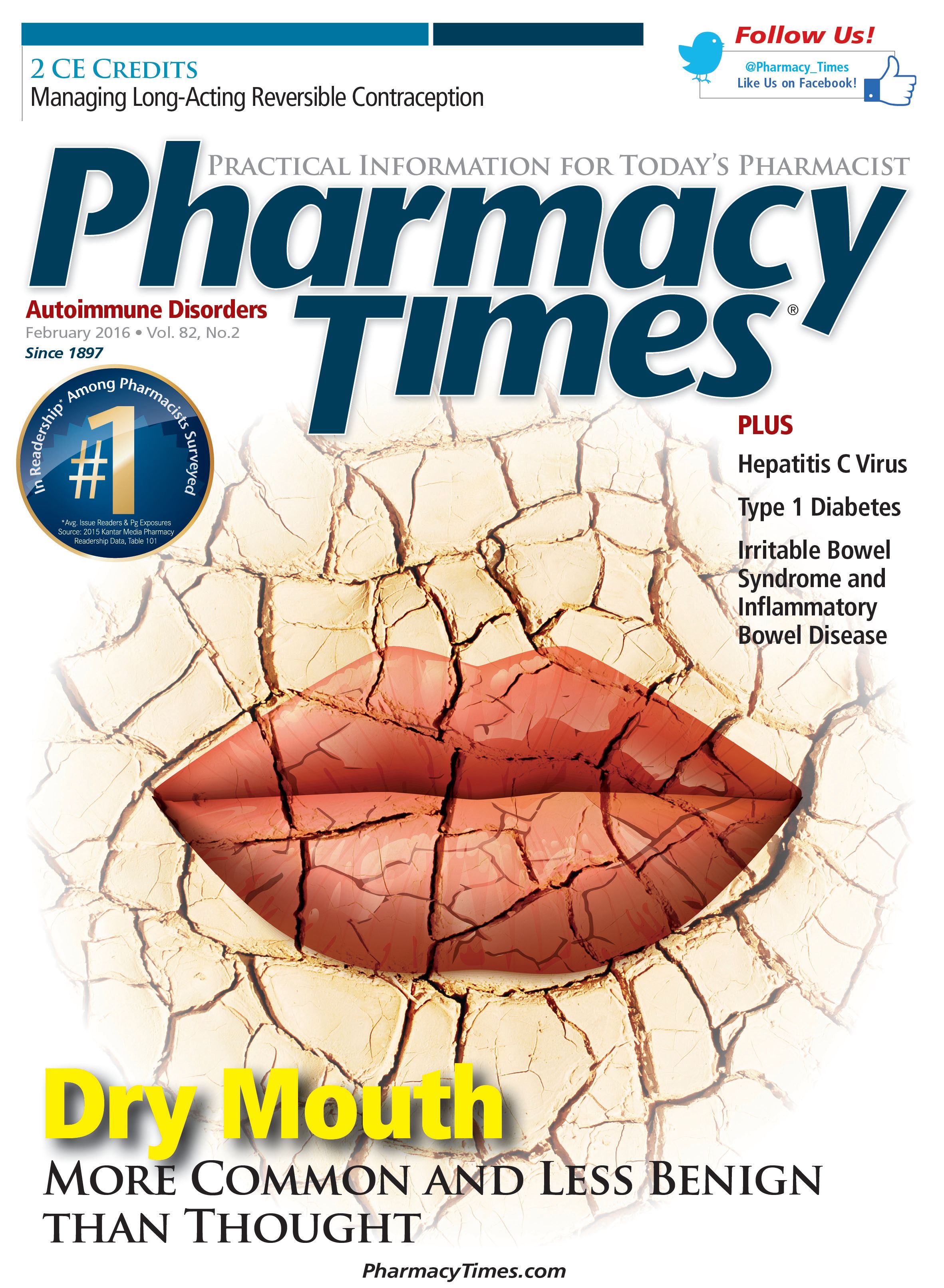Publication
Article
Pharmacy Times
Self-Care for Autoimmune Diseases
Which OTC products should these pharmacists recommend?
CASE 1: DRUGS TO AVOID IN INDIVIDUALS WITH THYROID DISEASE
A 57-year-old woman approaches the pharmacy counter seeking a recommendation for relief from cold symptoms. She reports suffering from a runny nose, sinus pressure, cough, and sore throat. Her symptoms have persisted for approximately 5 days. Up to this point, she has been using a nasal teapot and saline nasal spray intermittently for symptomatic relief. She complains of worsening headache and an inability to concentrate at work. She has a history of hyperthyroidism, for which she takes methimazole 5 mg 3 times per day. She also reports taking vitamins and dietary supplements, including vitamin D and a multivitamin with calcium. What information should the pharmacist provide regarding options for cold symptom relief in this woman?
ANSWER
There is no cure for the common cold. The pharmacist should emphasize supportive care, including hand hygiene, good nutrition, and adequate rest, and educate the patient on the selection and appropriate use of OTC agents. For alleviating this patient’s nasal congestion and sore throat, nonpharmacologic options would include the use of saline nasal spray, plastic nasal strips to open the airways at night, and application of aromatic oils such as camphor, menthol, or eucalyptus to soothe and open the airways.1 Pharmacologic treatment options could include the use of an antihistamine at bedtime to alleviate symptoms, as the cough is likely secondary to postnasal drip. Education on the potential for sedation, even with second-generation agents when used at therapeutic doses, should be provided. Importantly, the use of oral systemic decongestants, including pseudoephedrine, should be avoided because of this patient’s hyperthyroidism. These agents may exacerbate symptoms of this disorder. Remind the patient that symptoms persisting longer than 2 weeks require medical evaluation.
CASE 2: MANAGING PAIN ASSOCIATED WITH RHEUMATOID ARTHRITIS
A 48-year-old woman would like the pharmacist to recommend a pain medication for relief of her joint pain. She was recently diagnosed with rheumatoid arthritis (RA), which she reports primarily affects her hands bilaterally. Her rheumatologist has started her on weekly methotrexate, but the patient reports the pain makes it difficult to type on her keyboard despite taking the medication as prescribed. She would like a recommendation for an OTC pain medication that can be used in conjunction with methotrexate because she cannot remember what her physician recommended at her last appointment. What recommendations should the pharmacist provide?
ANSWER
For pain relief of RA, nonsteroidal anti-inflammatory drugs (NSAIDs) are generally accepted to be the first-line, but least potent, therapy for this disorder. These agents alleviate inflammation but do not slow disease progression or alter the course of the condition.2 Disease-modifying antirheumatic drugs, including methotrexate, slow disease progression but carry a greater risk of adverse effects (AEs), as do biologic-response modifiers and monoclonal antibodies indicated for treatment of this disease. In this case, it is prudent to recommend physician evaluation in lieu of self-care at this time. Medical evaluation can help to identify if this is a disease flare or acute worsening, for which a course of corticosteroid treatment may be warranted. Further, there is a potential drug—drug interaction between methotrexate (even a low dose) and NSAIDs. NSAIDs, by inhibiting renal prostaglandins, may result in impaired renal function or acute kidney injury, which could result in methotrexate accumulation and increased risk of toxic AEs. Prescribed use of NSAIDs, with physician oversight and monitoring of renal function and complete blood cell count, are prudent. Until the patient can be evaluated, encourage nonpharmacologic self-care for managing her pain (eg, warm compresses for stiff joints, ice for inflamed joints, massage of the affected area[s], relaxation, following the advice of an RA support group).3
CASE 3: TREATMENT OF FEVER
A 38-year-old man comes to the pharmacy looking for a recommendation for a medication to treat fever. He reports a history of Crohn’s disease (CD), for which he takes an immune-modifying medication. He does not recall the name of the medication, but reports he receives intravenous infusions at a local hospital every few weeks; his last treatment was 7 days ago. He is now experiencing fever and night sweats and cannot remember what OTC agent is safe for him to use. He denies having allergies to foods or medications. What advice would be reasonable to share with him at this time?
ANSWER
CD is a chronic inflammatory condition primarily of the gastrointestinal tract, although extraintestinal symptoms may also be present. This autoimmune disorder is commonly treated with anti-inflammatory medications (including aminosalicylates and corticosteroids), immunomodulators (including methotrexate, azathioprine, and mercaptopurine), or monoclonal antibodies. The goal of treatment is to reduce the inflammation characteristic of the disorder and induce disease remission. This patient is not eligible for self-care and should be referred to his primary care provider or gastroenterologist for further evaluation. Fever in a patient with CD could be indicative of disease flare, a reaction to a parenteral immune-modifying medication, or an infectious process secondary to immune-system suppression induced by disease treatment. For all individuals with immunosuppression, the pharmacist should err on the side of conservative treatment and recommend a medical evaluation to rule out potential complications or causes of symptoms.4
CASE 4: IMMUNIZATION NEEDS FOR A PATIENT WITH LUPUS
A 27-year-old woman wishes to speak to the pharmacist about whether she should receive the tetanus vaccine. She has had lupus for several years and takes a combination of hydroxychloroquine and high-dose prednisone each day, which has controlled her disease. Recently, at her last physician appointment, her immunization record showed she had not received several necessary vaccinations. Because she did not want to receive all of them on the same day, she was encouraged to get the others, including a tetanus vaccination, at a local pharmacy. However, after reading about live vaccines on the Internet, she became afraid of receiving them and wants to ensure that, before she is immunized, the tetanus vaccine is not live and is safe for someone with her condition. She denies having allergies to medications or food and reports taking medicines for high blood pressure. What recommendations or education on the tetanus vaccine should the pharmacist offer?
ANSWER
Due to unrestrained replication of live vaccine antigens, administration of them can result in serious or even fatal adverse effects in patients who are immunocompromised.5 This patient is correct in assuming that individuals with autoimmune diseases or who are receiving immunosuppressant medications, like her, should not receive live vaccines. She should, however, be told that all tetanus-containing vaccines are inactive and safe for individuals who are immunocompromised or are receiving immunosuppressive medications. Regarding the timing of vaccinations, combinations of inactivated vaccines may be given at any time before or after each other; there is no need to delay immunization at this time, regardless of when this patient saw her physician.5 She can receive her tetanus-containing vaccine after she is screened for other contraindications to vaccine administration and after review of her immunization records to verify which booster formulation, tetanus-diphtheria-pertussis or tetanus-diphtheria, is appropriate for her.
Got an interesting question regarding OTC medications? Contact the authors at [email protected] and share the details. Your case could be featured in an upcoming column!
Dr. Bridgeman is a clinical associate professor at the Ernest Mario School of Pharmacy, Rutgers University, and an internal medicine clinical pharmacist at Robert Wood Johnson University Hospital in New Brunswick, New Jersey. Dr. Mansukhani is a clinical assistant professor at the Ernest Mario School of Pharmacy, Rutgers University, and a transitions-of-care clinical pharmacist at Morristown Medical Center in Morristown, New Jersey.
References
- Scolaro KL. Colds and allergy. In: Krinsky DL, ed. Handbook of Nonprescription Drugs: An Interactive Approach to Self-Care. 18th ed. Washington, DC: American Pharmacists Association; 2015.
- Rheumatoid arthritis. University of Maryland Medical Center website. umm.edu/health/medical/reports/articles/rheumatoid-arthritis. Accessed January 11, 2016.
- How to handle rheumatoid arthritis pain. WebMD website. webmd.com/rheumatoid-arthritis/guide/coping-with-pain. Accessed January 11, 2016.
- Feret BM. Fever. In: Krinsky DL, Ferreri SP, Hemstreet BA, et al, eds. Handbook of Nonprescription Drugs: An Interactive Approach to Self-Care. 18th ed. Washington, DC: American Pharmacists Association; 2015:83-96.
- General recommendations on immunization. Centers for Disease Control and Prevention website. cdc.gov/vaccines/pubs/pinkbook/genrec.html. Accessed January 11, 2016.







